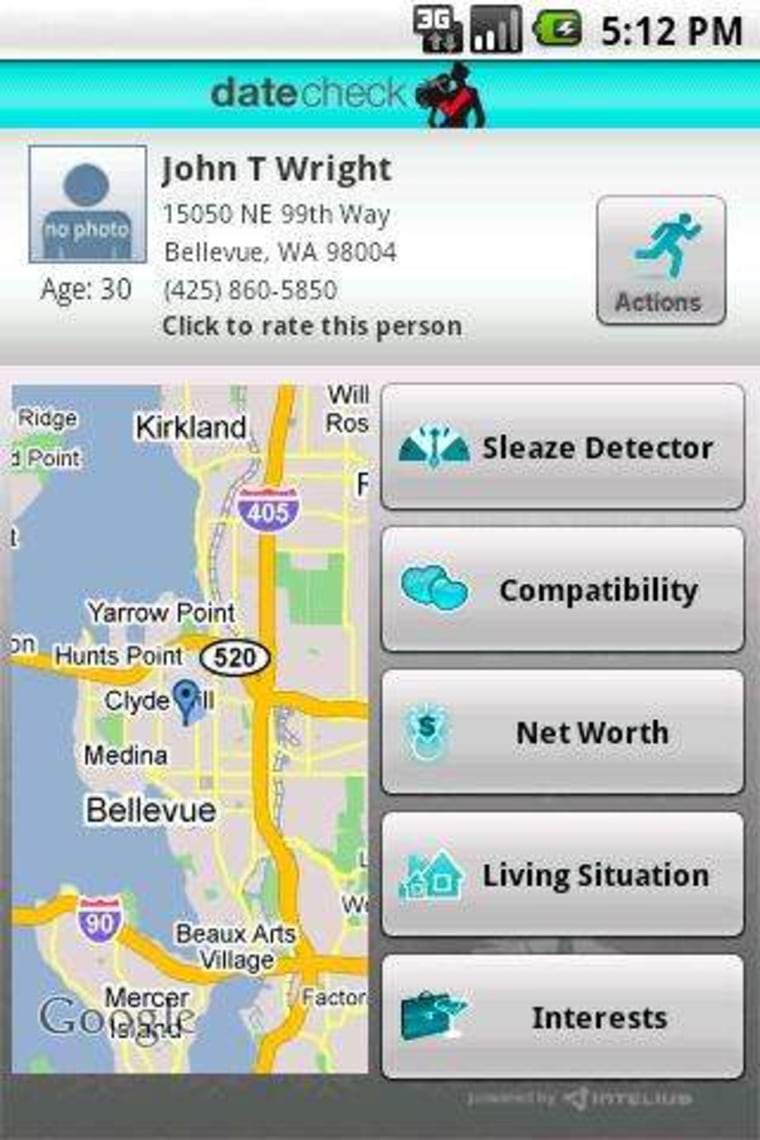Back in the day, a single man or woman would meet someone intriguing, collect his or her phone number, then head home to pump friends, family and colleagues for information.
Do you know this guy? Is she seeing anyone? Is he nice? Does she make a decent living?
Today, a new mobile phone program called DateCheck has streamlined that process. Instead of surveying friends and family for information, singles can plug in a name, phone number or e-mail address and plumb a slew of public databases to find out if Mr. or Ms. Seemingly Wonderful is married, a convicted felon or worse, a weekend clog dancer.
And they can do it while the person of interest is, say, ordering a drink at the bar or visiting the loo.
“In the time it takes to redo your lip gloss, you can check all this stuff out,” DateCheck’s promotional video touts. “It’s like having a private investigator right in your purse.”
Digging up dirt on a date is nothing new, of course.
“There are two kinds of people — those who Google their dates and those who lie about it,” said Dan Nainan, a 28-year-old professional comedian from Manhattan, who said he’s used the Web to find out if dates had criminal convictions or were lying about their age. “Who wouldn’t Google someone if they were going to go out or do business with them?”
Background checks, through a private detective or online services such as USSearch.com, RecordsRegistry.com, eFindOuttheTruth.com, DateSmart.com or DateDetectives.com (which partners with Intelius, the company that came up with the DateCheck app), have become more prevalent, especially as friendly fix-ups have given way to stranger dating through online dating sites.
“There was a time when people thought it was rather unromantic, when they looked down on checking someone out, but in the past five years, investigating a date has definitely become more acceptable,” said Vicki Siedow, a Los Angeles private investigator. “I just did one this weekend for a client who checks out everyone. Even before she meets a guy for coffee, she has me do a background check on him.”

John Arnold, co-founder and executive vice president of business development at Intelius, said the number of singles using the company’s online investigative services to check out dates was one of the reasons Intelius decided to create the DateCheck phone app.
The program is still under review by Apple for its iPhone and Research In Motion (maker of BlackBerrys), but is available for Android phones such as the Google G1 and myTouch, as well as Motorola’s new Cliq.
“We run periodic surveys of our customers and one of our larger responses was in the dating space,” he said. “It seemed an appropriate direction to go when we kicked off our flagship mobile app.”
Intelius’ information comes from public records and publicly available sources such as departments of corrections, courts, sex offender registries, property deed and tax assessor records, with DateCheck’s “dirt” divvied into five specific areas.
The “Sleaze Detector” checks for criminal convictions, sex offenses and other red-flag raising issues while “$$$$” looks up property ownership information (including assessed property values).
Other features delve farther: “Compatibility” gives users a birth date and offers astrological insights; “Interests” gleans employment, education and social networking data; and “Living Situation” finds out who, exactly, the person is sharing his or her home with (a wife? a boyfriend? his mother?) by tapping property — and other — public records.
Some data is free, but the juicy stuff (specifics on criminal convictions, lists of aliases, bankruptcy records) requires a fee — anywhere from $1.95 to find out the names and ages of the people sharing a potential love interest’s home (information on children under 18 is not provided) to $39.95 for a full background check.
A bit of a tease
And yes, DateCheck can be a bit of a tease.
“The summary level of Sleaze Detector — the free level — is very bare bones,” said Arnold. “You’ll get a summary of the criminal records associated with a name, such as, ‘We found three criminal records for John Smith in the state of Washington.’ But if you want to know if someone has a protection order against them for domestic violence, you have to pay for it.”
As it turns out, many women are more than happy to do just that.
Lisa Oldham, a 42-year-old business owner from Dallas, gladly ponied up $39.95 to Intelius to check out a man she met via an online site who seemed a little hinky.
“He kept asking me out and calling me after that first date but something didn’t feel right, so I ended up investigating him,” she said. “I found out that he’d been in jail for grand theft auto and had a string of stolen and fraudulent check charges. I ran as far and fast as I could.”
Oldham said safety — for herself, her children and her assets, such as the PR business she built from scratch — is her main concern when it comes to rooting around in a date’s business, although she acknowledges there can be other motivations.
“There are people who use it as a tool to find out how much somebody makes, but I think most people just want to find somebody’s who’s honest and trustworthy and who’s safe,” she said. “I have two kids, a successful business. These things could be put in jeopardy if I allow someone in who’s a smidge shady.”
Would she use a phone app to get the 411 on someone she’d just met?
“Just plugging in an e-mail address to get instant information about somebody sounds creepy,” she said. “It’s pretty Orwellian. For me, it’s more of a case-by-case scenario. You have to have faith in people right out of the gate.”
Uses and abuses
Stephen Lichtenstein, professor of law at Bentley University in Waltham, Mass., said he understand singles wanting to avoid predators or people who are married, but digging around in a stranger’s life without their knowledge may not be the way to go about it.
“Some things that are legal are not necessarily ethical,” he said. “If somebody meets me in a bar and gives my information to some third party that I don’t know and they do a background check on me, even though it’s public information, why not at least contact me and say, ‘X has inquired about you and we’re going to do a background check.’ I do have a problem with this ethically.”
It’s not the first time Intelius’ information services have raised questions. In early 2008, the company withdrew a plan to compile a cell phone directory of 90 million numbers after drawing fire from consumers and privacy advocates.
Lichtenstein also worries that DateCheck’s vast network of instantly available information could be used not for good, but for evil.
“This to me smells like an opportunity for somebody who wants to stalk somebody,” he said. “My main concern is the misuse of it.”
Intelius’ Arnold, who’s been married for 21 years (and no, he didn’t investigate his wife), argues that DateCheck is more about leveling the playing field than putting tools into the hands of creeps.
“The creeps are already armed up,” he said . “They’re way ahead of the game. This is more of a way for consumers to fight back. This is an ‘in the moment’ application so when you meet someone and you’re away from home, you can make the decision to either engage or politely move on.”
Grain of salt
Siedow, the private investigator, said she, too, is all for dating safety, but worries singles could be lured into a false sense of security because of data that doesn’t show up. Or, she said, a person’s name could be confused with someone else’s, resulting in a scenario where an innocent man or woman is labeled as a criminal.
“In this day and age with everything that’s out there, I think it’s foolish not to check (people out),” she said. “But you have to remember to take the information with a grain of salt.
“People need to be very aware of the limitations. It could lead to false positives or false negatives and it could be used in ways that are not intended.”
For singles such as Oldham, though, hooking up with a pocket-sized dating detective seems a bit like dating itself — a mixed blessing.
“It’s a great way ... to catch red flags, but it does open up the possibility that people will find out where you live, what property you own, what your house is worth, what your house looks like,” she said. “That’s the chance you take with technology these days. I’m sure Google maps will soon be able to see in my underwear drawer.”
